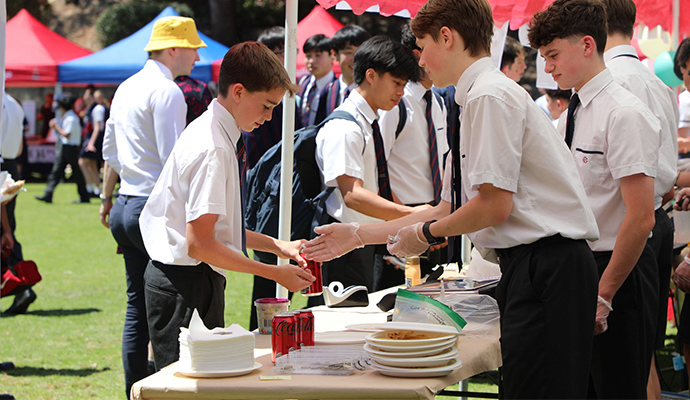Commerce is an elective which is studied in Years 9 and/or 10. As you can see from the course outlines below, the students cover a wide range of subject matter. The classes engage in a wide variety of learning experiences that students use to discover their own preferred learning style. Our teachers create a positive and stimulating environment, providing learning and teaching activities ranging from direct teaching, presentations to group and on-line activities all of which our students find both challenging and rewarding.
Contact
Head of Department: Andrew Watts
Email: AWatts@barker.nsw.edu.au


Year 9
A highlight of the Year 9 course is Market Day. This allows students to learn the fundamental concepts in the planning and preparation of running a small business. Students use skills and knowledge acquired throughout the Year 9 course to help them run the Market Day stall in Term 4.
Year 9 Commerce
• Consumer and Financial Decisions – Students learn how to identify and research issues that individuals encounter when making consumer and financial decisions. They investigate laws and mechanisms that protect consumers including the process of consumer redress and responsible financial management strategies.
• The Economic and Business Environment - Students develop an understanding of the economic environment, including markets. They explore the nature, role and operation of businesses in the context of an increasingly globalised economy. Students investigate the effects of changes in the economy on consumers and businesses.
• Promoting and Selling - Students investigate the promotion and selling of goods and services including social, ethical and environmental considerations. They analyse the strategies that sellers use to promote products and maximise sales, and evaluate the impact on consumers.
• Running a Business - Students investigate how entrepreneurial attributes and dispositions that contribute to business success, and examine the considerations involved when planning and running a business. Students apply this understanding by developing a small business to run on Market Day.
Assessment Structure
Commerce is assessed through a variety of different techniques including presentations, problem-solving activities, independent research and formal examinations.
Year 10
The Year 10 course provides the students with the opportunity to examine the rights and responsibilities that they will have in their very near future. The topics present many current real world issues which can be explored and their impact more clearly understood by the students. A highlight of this course is the Australian Securities Exchange share trading game. The students attack this venture with great enthusiasm and they learn real skills and develop a clearer understanding of the world of finance and investing whilst enjoying the competitive nature of the activity.
Our courses are structured in a manner which allows the study of issues as they arise in the real world. Whether it be an upcoming election, a product recall, an important legal issue or an interest rate change, our classes study the event to deepen their understanding of the world in which they live. This truly makes the course relevant and enjoyable for all students.
It is not a pre-requisite to study Commerce in Year 10 if you are considering studying Business Studies, Legal Studies or Economics in Year 11.
Year 10 Commerce
Law, Society and Political Action: Students develop an understanding of how laws affect individuals and groups and regulate society, and how individuals and groups participate in the democratic process. Students examine various legal and political systems and investigate contentious legal and political issues.
Investing: Students explore the range of investment options available and analyse information and data to make informed investment decisions. They examine the role and responsibilities of the financial services industry.
Our Economy: Students investigate Australia’s place in the global economy, measurement of economic performance, trade patterns, the impact of changes in our economy and the implications of these changes for consumers, businesses and broader society.
Employment and Workplace Futures: Students investigate the contribution of work to the individual and society and the changing nature of work. They also examine how individuals may derive an income, the changing rights and responsibilities of workplace participants and consider their future employment opportunities.
Assessment Structure
Commerce is assessed through a variety of different techniques including presentations, problem-solving activities, independent research and formal examinations.

